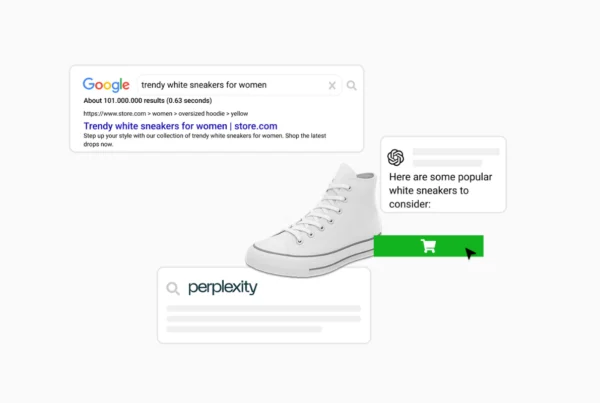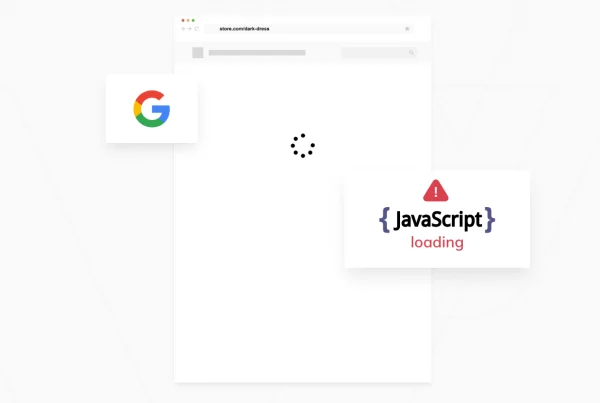How Google Overview AI changes SEO for e-commerce brands
Estimated reading time: 4 minutes

In May 2024, Google rolled out AI Overviews (formerly known as Search Generative Experience, or SGE), a game-changing feature that’s transforming how users interact with search and how brands drive traffic. In May 2025, it was recently expanded to +200 countries.
While AI Overviews promise faster, smarter answers for users, they also introduce new SEO challenges, especially for e-commerce websites that rely heavily on organic visibility.
So, what exactly is Google’s AI Overview, how accurate is it, and how will it affect your e-commerce SEO strategy?
Let’s break it down.
Google’s AI Overview uses generative AI (powered by Gemini) to create short, summary-style answers pulled from multiple sources across the web. These AI answers appear at the very top of the search results, above ads and organic listings, and include links for deeper reading.
Think of it like a supercharged featured snippet, but instead of citing a single source, it blends multiple perspectives into one concise block.
As of June 2025, AI Overviews are live in over 120 countries, including the US, UK, France, and Belgium. Unlike its early testing phase, users no longer need to opt in, the experience is now integrated directly into the standard search flow.
How accurate is Google’s AI Overview?
One of the biggest concerns around AI-generated answers is accuracy. So far, the results have been mixed:
- Contextually accurate in most cases, especially for general or well-established topics.
- Risk of outdated or misinterpreted information, especially for nuanced or fast-changing content.
- Lack of source clarity: While Google does cite sources, the AI summary may not accurately reflect each source’s original nuance or intent.
For brands, this means you may appear in an AI overview but not in the way you want. Even worse, your competitors might be featured more prominently even if your content is stronger.
What is the impact of AI Overview on SEO performance?
Declining click-through rates (CTR)
Recent studies reveal a clear trend: when AI Overviews appear, clicks drop.
- Amsive found a 15.49% average CTR drop for keywords triggering AI Overviews
- For pages ranked below position 3, CTR dropped by 27.04%
Why? Because users often get their answer without needing to click.
Zero-click searches are rising
This is a direct consequence. More AI answers = fewer clicks = more zero-click searches.
- According to Semrush, AI Overviews appear in 13.14% of queries as of March 2025
- That’s more than double what it was in January (6.49%)
And this trend isn’t slowing down.
How Google AI Overview changes SEO for e-commerce?
Informational queries are at risk for SEO
AI Overviews are primarily triggered by informational queries, like:
- “best hiking shoes for flat feet”
- “how to clean white sneakers”
- “sustainable brands for winter jackets”
These are precisely the types of queries e-commerce SEO teams use to attract top-of-funnel traffic. That traffic may now go to AI summaries instead of clicking on your blog post or buying guide.
Transactional queries like “buy Nike Air Max 97 size 42” are less affected, for now. But as Google improves, it could blur the line between informational and commercial intent.
AI Overviews appear above paid ads, in top result in SERP
Even if you’re investing in SEA or Shopping ads, AI Overviews now sit at the very top of the SERP.
This new layout reorders the SERP hierarchy:
- AI-generated answer (Google AI Overview)
- Sponsored results
- Organic listings
This means fewer clicks for both paid and organic content, even if your site is ranking well or spending heavily on Google Shopping.
How can e-commerce brands optimize for Google AI Overview?
Google AI Overview is here to stay and it’s built on the same rules SEO experts have followed for years. But adapting is key. Here’s how to future-proof your strategy:
Focus on topical expertise
AI Overviews prioritize content that shows real-world experience and niche authority.
- Use expert voices, customer quotes, or user-generated content
- Build content clusters, not one-off posts
- Cover your topic comprehensively, across multiple pages
Optimize for inclusion
Even if users don’t click, being cited builds visibility and trust.
- Add a summary paragraph under each H1 for clarity
- Use short, clear sections that AI can easily extract
- Structure your content to answer questions quickly
Leverage structured data
Structured data helps Google (and its AI) better understand your content.
- Use JSON-LD schema for product, article, FAQ, and HowTo pages
- Prioritize clear formats Google can parse and present in Overviews
Structure data improves chances of being featured both in AI and classic search features.
Target more long-tail transactional keywords
If informational space is shrinking, double down on mid-to-bottom funnel queries that drive sales. Think “black leather boots size 39 UK” instead of “winter footwear trends”.
These keywords may have lower volume but much higher conversion rates.
At Verbolia, we’ve developed Vpage, a solution that identifies and creates thousands of SEO-optimized long-tail pages automatically. It leverages large language models (LLMs), product feeds, internal search data, and Google Search Console, helping you scale SEO efficiently without sacrificing quality.
What’s the difference between AI Mode and AI Overviews?
AI Mode and AI Overviews are both features in Google Search, but they serve different purposes. AI Overviews give you quick, AI-generated summaries at the top of your search results, great for getting a fast answer without clicking around. AI Mode, on the other hand, turns your search into a conversation, letting you ask follow-up questions and dig deeper into a topic.
While AI Overviews are automatic and show up for many queries, AI Mode is something you opt into and interact with more directly.
Think of AI Overview as a shortcut to useful info, and AI Mode as your space to explore ideas and ask “what if?” questions.
Final thoughts
Google AI Overviews are the biggest shift in SEO since featured snippets.
For e-commerce brands, they’re both a threat to the status quo and an opportunity to evolve smarter strategies.
By focusing on topical depth, clear summaries, structured data, and transactional keywords, you can still win, even when AI takes the top of the page.
Future of search: How Verbolia can help e-commerce brands?
At Verbolia, we help e-commerce companies adapt to the new SEO landscape with:
- Vpage: CMS to publish pages optimized for bots (Google, AI Overview, ChatGPT, Perplexity, …)
- Vlink: Dynamic internal linking
Let’s talk about how we can help you grow in the AI era. Contact us to get started.
About The Author
How can Verbolia help your e-commerce platform.



